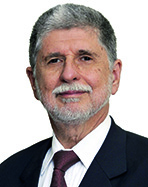 Celso Amorim is a former Brazilian Ambassador to the United Kingdom and the United Nations, as well as Minister of External Relations (1992–1993 and 2003–2010) and Defense (2011–2014) of the Federative Republic of Brazil.
Celso Amorim is a former Brazilian Ambassador to the United Kingdom and the United Nations, as well as Minister of External Relations (1992–1993 and 2003–2010) and Defense (2011–2014) of the Federative Republic of Brazil.
There are events so horrible in themselves that merely attempting to look into their deeper causes seems inappropriate. The only reaction we can show towards them is one of revulsion and condemnation. The barbarous massacre of innocent civilians—many of whom were young people engaged in leisurely pursuits at the end of a long work-week, which led French President François Hollande to declare that “France is at war”—certainly falls into that category. Any attempt to explain the savage killings may, thus, appear as a disguised justification, which they certainly do not deserve. And yet, it is the duty of political and social scientists—and even more so of politicians—to understand the forces behind the horrible acts perpetrated in the heart of Paris on Friday, November 13th, 2015.
Paris is the “City of Light,” which gave birth to so many of the symbols of our civilization, the meeting ground for artists and thinkers of diverse origin, the birthplace of ideas upon which modern democratic institutions were built. Paris has also long been the place of choice for intellectuals who could no longer live in their own countries, for fear of persecution (or worse). Some of them came from Eastern European “popular democracies”; others from military dictatorships in Latin America and other parts of the “Global South.” The atmosphere of free thinking and tolerance made the city a point of attraction for all those interested in giving leeway to their creativity, or wishing to test the validity of their ideas in public and lively debates.
Most appropriately, Paris was chosen after World War II as the headquarters of the United Nations Educational, Scientific and Cultural Organization (UNESCO), which succeeded the Bureau International d’Education that was created in the period between the two World Wars. UNESCO’s Charter prescribes, as one of its main objectives, to instill “peace in the hearts of men.” This is no doubt a lofty ideal to be pursued by every human being. It is, or in any event should be, the basis of every religion and philosophical creed. But inevitably one is led to pose the question whether this most laudable goal is attainable by political means, or if it belongs exclusively to the domain of religion and philosophy. Politics—or government—cannot be totally separated from ethics, lest it gives way to what St. Augustine qualified as a “group of road robbers.”







